- News
- Reviews
- Bikes
- Components
- Bar tape & grips
- Bottom brackets
- Brake & gear cables
- Brake & STI levers
- Brake pads & spares
- Brakes
- Cassettes & freewheels
- Chains
- Chainsets & chainrings
- Derailleurs - front
- Derailleurs - rear
- Forks
- Gear levers & shifters
- Groupsets
- Handlebars & extensions
- Headsets
- Hubs
- Inner tubes
- Pedals
- Quick releases & skewers
- Saddles
- Seatposts
- Stems
- Wheels
- Tyres
- Tubeless valves
- Accessories
- Accessories - misc
- Computer mounts
- Bags
- Bar ends
- Bike bags & cases
- Bottle cages
- Bottles
- Cameras
- Car racks
- Child seats
- Computers
- Glasses
- GPS units
- Helmets
- Lights - front
- Lights - rear
- Lights - sets
- Locks
- Mirrors
- Mudguards
- Racks
- Pumps & CO2 inflators
- Puncture kits
- Reflectives
- Smart watches
- Stands and racks
- Trailers
- Clothing
- Health, fitness and nutrition
- Tools and workshop
- Miscellaneous
- Buyers Guides
- Features
- Forum
- Recommends
- Podcast
feature
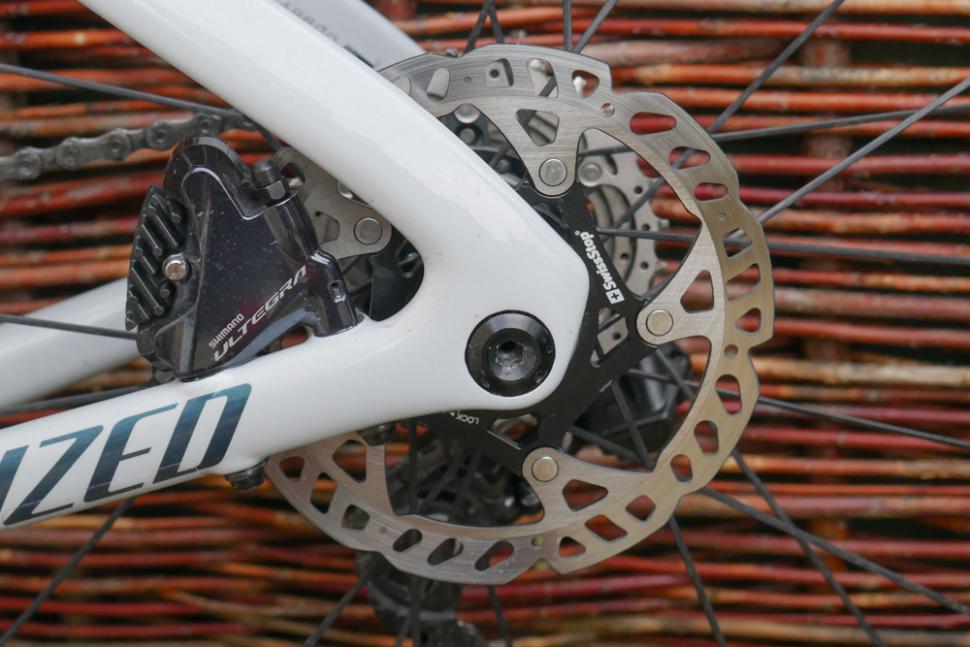 SwissStop Catalyst Rotors 140mm
SwissStop Catalyst Rotors 140mmWhat’s wrong with Chris Froome’s disc brakes?
Chris Froome moved from the Ineos Grenadiers (formerly Team Sky) to Israel Start-Up Nation for the 2021 season, and he’s done more than change his jersey. Froome has also switched from Pinarello to Factor bikes, a move that will see him racing on disc brakes for the first time in his career.
But in a video where he tried his hand at reviewing his new Factor Ostro VAM, Froome wasn’t singing the praises of disc brakes. Despite saying that the performance in both wet and dry conditions impressed him, he didn’t feel the same way about all aspects of his new components. It's a very honest review of the bike which is certainly refreshing from a pro rider, most of whom usually repeat the lines that the marketing department has given them.
> 8 reasons not to get disc brakes — find out the hassles before you switch
We’ve re-watched Froome's review, paying particular attention to his comments about what he doesn’t like about those disc brakes, and we’ve noted the likely causes, the fixes, and how to avoid the issues in the first place. You can thank us later, Chris. Maybe in your Tour de France winner’s speech.
Froome makes a valid point regarding disc brakes being something that many racers wouldn’t have chosen had the manufacturers not pushed them. Froome says that they “are going to have to adapt and learn to use them, because if you're not on disc brakes already it's only a matter of time before you're made obsolete and forced onto them.”
Froome's points are also common issues that many riders that are new to disc brakes will encounter, so it is certainly useful to explore the tips and tricks that will make the disc-brake user experience better if you too have just switched over.
Before we dive in, we’re not about to bash either rim brakes or disc brakes. Each system has good and bad points and has been used in and out of the racing world just fine for years.
Right then, let’s get into the issues that Froome cited in his video, and see if we can help fix them.
A downside to disc brakes is the constant rubbing
Yep, just like a rim-brake, a disc system will rub if incorrectly set up. If the rubbing is constant and you can hear the noise through the whole rotation of the rotor, the calliper needs repositioning. Check the thru-axle is tight first.
> How to look after disc brakes — 7 ways to get the best performance
If you can hear a noise at only a certain point in the rotation, the rotor is likely bent/warped. Straighten it with a disc brake rotor truing tool.
Potential for mechanicals
What can go wrong with a hydraulic disc brake system out on the road? There are a few things like a loss of braking power caused by a leak in the system, the brake rubbing, or even just noise caused by contamination.
Fixing these problems while out training or on a leisurely ride is a case of riding home with one working brake, attempting to straighten the rotor, or simply putting up with the noise.
> Everything you need to know about disc brakes - read our definitive guide
If you’re a pro in a race, you can switch to your spare £11,000 bike at a quiet moment, but an issue with a rim brake setup would likely have you dropping back to the team car anyway.
We'd say that a snapped brake cable and a loss of pressure in a hydraulic disc brake system are equally rare. To avoid issues with either system, check your brakes regularly and keep on top of cleaning and maintenance.
Overheating
If you drag any brake system – ride with the brakes engaged – you’ll eventually overheat a certain part of that system. On a rim brake bike, you could end up exploding the tyre’s inner tube, melting the tubular glue if you’re on tubs, delaminating the carbon brake track, or something else equally disastrous.
Disc brakes, on the other hand, simply fade (they lose power) – but it takes a very steep hill, a lot of weight and a long time dragging the brakes to do this. The air temperature is also a factor.
On both rim brakes and disc brakes, the answer is simply to avoid dragging your brakes. Actuate them one at a time, allowing each to cool off a bit before you next use it.
The discs become warped
This is a really annoying one. Under really heavy, repeated, or consistent braking, disc rotors can warp, or in simpler terms, go a bit wonky. They need straightening with a proper disc brake rotor truing tool. It might be a good idea to add one to your saddlebag; they’re not heavy.
One piston firing more than the other
This is a dastardly problem that is tricky to spot unless you’ve got the pads out, exposing the pistons.
One piston that moves less than the other can be caused by brake dust that gets deposited on the piston’s rim. If this contamination gets trapped between the calliper and the piston, it can cause friction, stopping the piston from moving freely.
To avoid this, don’t press the pistons back into the calliper if they’re dirty.
> What's the best way to clean disc brakes on a bicycle?
If you have done this, the fix is to clean the brake dust off. You’ll need to expose the piston by actuating the brake lever without the pads in the calliper. Go careful, you don’t want to press the pistons out.
Next, clean the piston rim using cotton buds and something like acetone. Before you press the pistons back into the calliper using a proper piston press, apply a little brake fluid to the piston rim using a clean cotton bud.
You can take this chance to ‘exercise’ each piston individually by actuating the brake while holding the opposite piston back with a plastic tyre lever. Repeat this until both pistons move equally.
Will Froomey be a contender in 2021 if he gets his brakes sorted? Let us know what you think.
Latest Comments
- Destroyer666 3 hours 28 min ago
Anodizing the aluminium is also for corrosion resistance and therefore enhances the longevity of the rims while this is not really a case for...
- bobbinogs 4 hours 42 min ago
Wheelsmith has always been very good for me. Malcolm was always very opinionated so I got bored with him telling me I should be riding tubeless,...
- Terry Hutt 5 hours 1 min ago
I assume you can carry an e-bike battery on the tube if you leave the bike at home. ...
- chrisonabike 6 hours 3 min ago
I love it - it's a roundabout with a sculpture of a roundabout on its desk!
- cmedred 6 hours 4 min ago
From the position of the cyclist when the video starts and the position of the bike later, it looks highly unlikely that the cyclist went "into the...
- Rendel Harris 6 hours 10 min ago
To rhyme with design. I wondered this myself so looked it up a while ago, according to the founder Micki Kozuschek he and his team had a few...
- Rendel Harris 7 hours 4 min ago
It's not being pedantic at all, careless driving is successfully prosecuted (and I have been in court more than once when a driver has been...
- HLaB 7 hours 27 min ago
It's hopefully an urban myth but I heard it was designed that way on purpose, so the cyclepath captured any flooding and the busway would remain clear
- mdavidford 7 hours 30 min ago
I should imagine eating chopsticks anywhere could be potentially rather perilous.
- Rendel Harris 7 hours 48 min ago
When The Badger stopped for protesters (albeit dockworkers rather than farmers) it was their stress gauges rather than his that would have been...
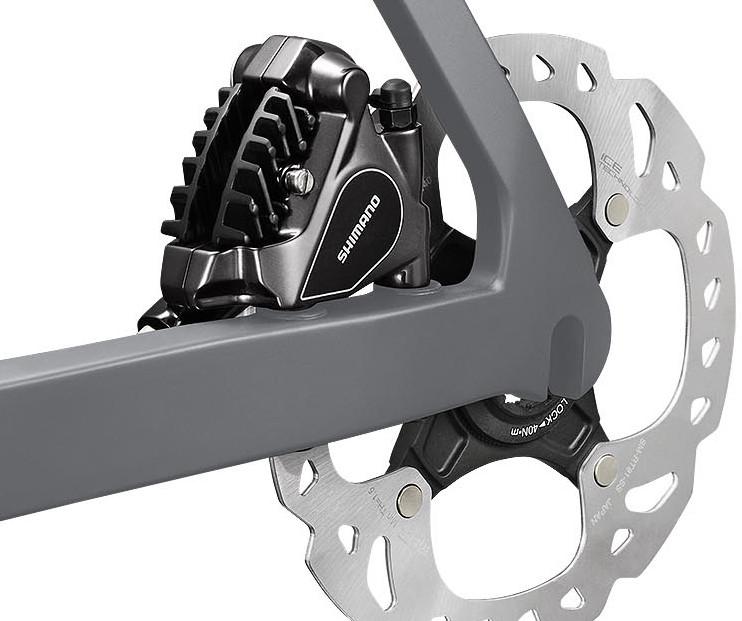
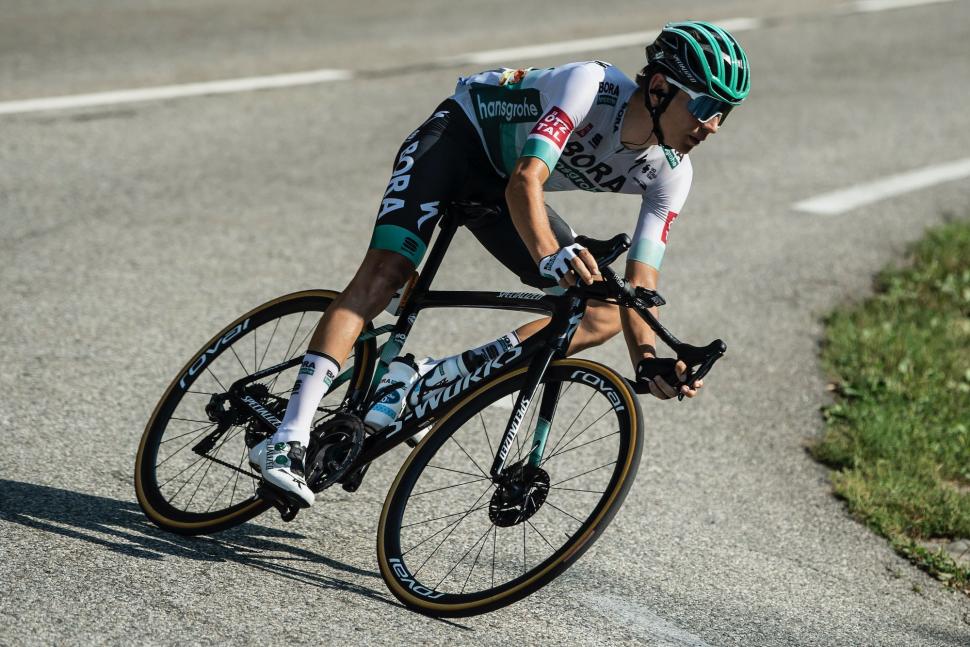
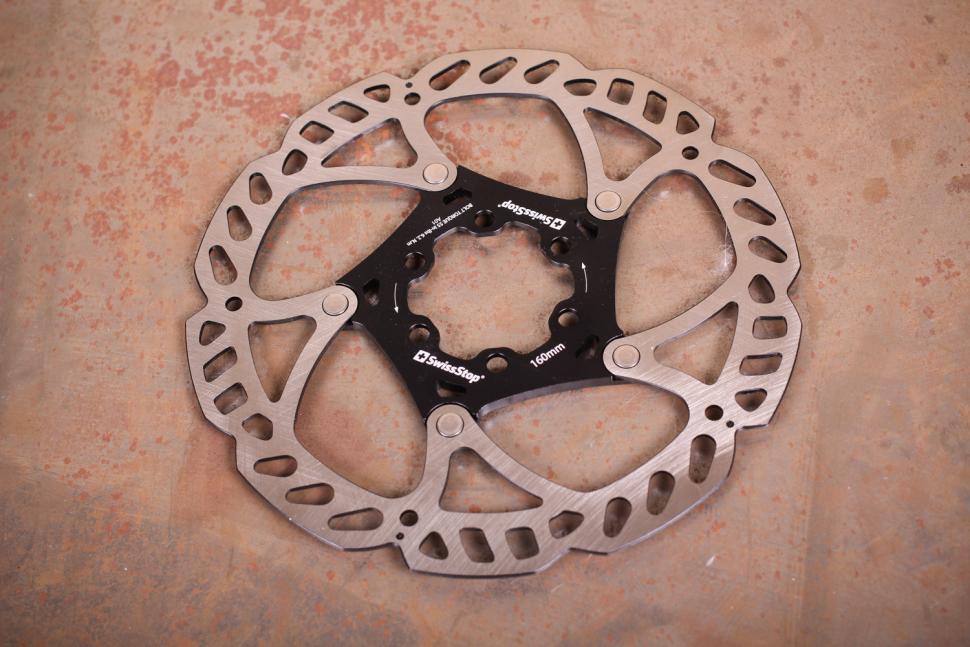
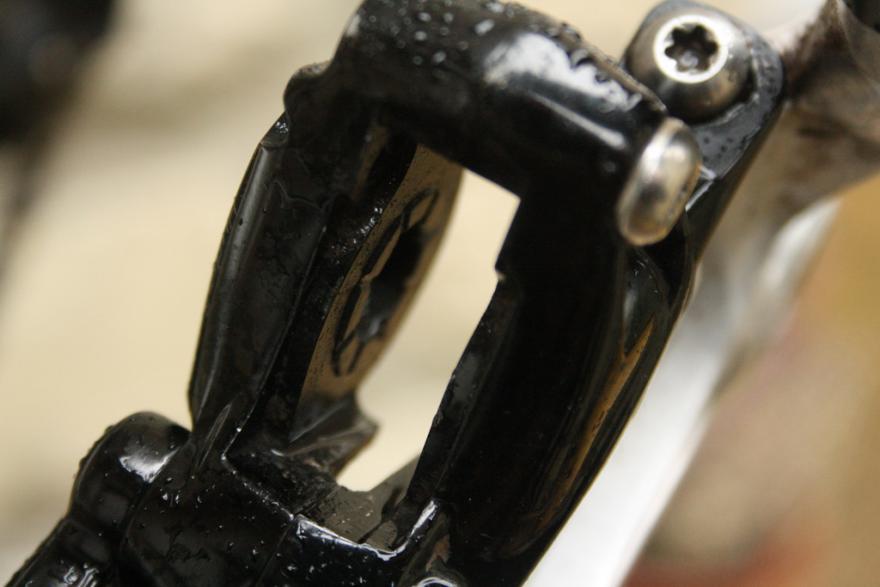
Add new comment
84 comments
Disc brakes sound a bit like tubeless tyres.....great - until they are not. And then that quick job of changing an innertube becomes a messy nightmare.
There's another discs thread somewhere, but this one still seems to be going so I'll put it here. I was out this afternoon and was caught out in the North Lancs. hills by a downpour just short of torrential. I forgot about the trusty TRP Spyres because they were just working well, until I realised the much talked-about squeal had not been present at all in the blitzing rain (not uncommon here, for foreigners), not even an initial squeal which I find is not uncommon, but not invariable either, in ordinary rain. I was out for 90 minutes with no squeals at all- and reliable braking down steep hills. The Joy, The Joy!
Quality hydraulic disc brakes are great but perversely, I prefer the simplicity of cable rim brakes; there's a good reason hydraulic disc brakes are used with motor vehicles - they are far superior to cable, rod and hydraulic drum brakes.
The thing for me is that I want to be the one who makes the choice. I do not want to be guided/forced by some marketing guru who is probably great at marketing, but less so at riding a bike.
I love my rim brakes. I especially love the brakes on my touring bike. I have toured in parts of the world where disc brakes are a bit like space travel or running water in your house. Good luck when your disc brakes play up!
Just allow choice.
I loved my choice of a triple on my tourer when the rear mech failed: I survived the rest of the day on my 3-speed!
Just allow choice.
I loved riding without a helmet in a very hot place where a car might pass every hour.
Just allow choice.
Etc. etc.
You can, and will still be able to buy bikes with rim brakes for years and years to come. Probably as long as there are bicycles around. Why? Because there will always be a market wanting them (people like you). It may be that the mass manufacturers stop supporting them, but somebody will. So you will still have the choice.
PP
Thanks Pilot Pete, all very reassuring. I am 61 and aiming for a whole bunch more years of cycling. I reckon cycling/exercise has got me this far, so here's hoping rim brakes last the pace.
Oh, and the other longevity ingredient.... luck!
Perhaps the big technological leap that would keep Chris an many others happy, would be ABS? I've no idea how or even IF it will be possible to reduce the size and complexity of an ABS system such that it would be appropriate on a lightweight road bike that has no built in source of power (like cars, motorbikes and even now a few eBikes do for their ABS systems) but that would certainly be a game changer if it could be made to work.
Good point
The biking industry is going to wait before they introduce ABS, they'll wait till the sales of bikes slow down, then BOOM, out will come the "new" ABS brakes with the intention that people will rush out and buy new bikes again so they get the latest newest technology, this is how the game is played, it's all about money.
I'm guessing you enjoy riding your 5 speed with downtube shifters still?
Raleigh Olympus?
Disc brakes are totally unnecssary on a road bike, mountain bike yes but road bike no.
If you want them that is fine, that is your choice, but anyone who claims you can stop better with disc brakes, has either had crap rim brakes previously or did not know how to set them up properly.
Add that to the fact that disk brakes make a road bike look like a tractor and add weight and the only thing you have left is gullible people easily fooled by marketing hype and people who like to be fashionable.
Sorry, but like it or not this is the truth of the matter.
Sorry, but like it or not this is the truth of the matter.
Not sorry and no it isn't.
It is the truth.
Truth is a three-edged sword.
Lots of people have tried both (including me) and generally agree that disc brakes offer much better stopping control (especially in the wet). I don't think it's really a fashion statement but more pragmatism.
The other benefit is that you can then use wheels that don't need to be designed to have a braking surface which can hopefully lead to better aerodynamics (or possibly a small reduction in weight, though that's far less important).
I sometimes wish my bike did look like a tractor - cars would give me a bit more room.
Make your bike look like a tractor? hardly a truth more a matter of opinion, I like the look of disc brakes, if you don't fair enough but don't claim it as a truth.
Rest of your post is also debatable.
Exactly. Beauty is in the eye of the beholder. I think my disc braked Colnagos look fabulous. My disc braked winter bike (Felt F65X with full guards etc) got a 'supernice' on GCN, so can't be that tractor like.....! And it's an aluminium lump that weights a tonne, but gets the job done....
I don't look at it and think, my god that bike is ugly, looks like a bloody tractor.
PP
That bike really does look like a tractor tbf. As does any properly set up winter bike.
I see that bike and I want to ride it, on a cold winter's day. It's beautiful to me because I wants to ride it.
I think you're replying to the wrong person
If they give even marginally better stopping power or modulation, have the smallest aero advantage and the bike still comes in bang on the lower weight limit, what is the rider losing?
Edit: didn't read last post properly
Disc brakes have a big aero penalty
Yeah, on an old frame adapted for discs, maybe, but the newer frames designed for discs have become more aero than rim-brake frames because they can be designed to be so and don't need to contend with big chunks of aluminium such as rim-brake calipers in wind-catching areas.
That's just not true, it's what bike brands want you to think, so you swap your *insert expensive rim road bike* for the new 2021 disc brake version.
better braking in the wet and bit better in the dry yes, but also more faff and less aero.
No, not a bit better in the dry, read on and I will tell you what a friend and I did. When this test was done I did not own a disk brake bike, since then I do own one only because the bike came with them, but anyway here was the test.
My friend had a newish road bike with Shimano Ultegra hydro disk brakes and my 5-year-old bike at the time of the test had Shimano 105 rim brakes; his bike was fitted with Continental 4000S 25c tires and mine had Vittoria Rubino 23 tires, we put the exact same amount of air in our tires because with the weight of the bikes and riders we were within 2 pounds of each other; this was a dry day about 80 degrees outside. So the test was that we had to stay seated and not slide our butts rearward to get more weight over the back tire, there would be 3 sets of 3 runs each set, first set was 15 mph, the second set was 20 mph, and the last was 25 mph. We took turns yelling stop so as to eliminate pre-knowing reaction time, and these were to be full-on panic stops. In the first two sets, we stopped within a foot of each other, sometimes I stopped a bit shorter and sometimes he did, we called it a tie, but something interesting happened in the 3rd set, the first stop I was a foot shorter, we blew that one off thinking I reacted faster, the 2nd stop I stopped about 3 feet shorter, and on the 3rd stop I stopped about 6 feet shorter! We determined he had brake fade, so he touched his front rotor and singed his finger, but wasn't able to singe his other finger on my front rim though it was hot, just not that hot, I wish I had one of those laser temperature thingys.
So while I know this was not very scientific but we did the best we could with what we had, I would have thought that on tires alone his would have stopped better than mine since mine were cheaper tires and narrower tires.
My new bike is a touring bike and it came with mechanical disk brakes, my old 29-year-old touring bike had the original cantilever rim brakes, other than the smoothness of how the new disk brakes actuate I can't say for sure if they stop better than the old cantilevers, and I can't test them with loaded weight since the old one was destroyed in an accident and unrideable which is why I had to buy a new one. But they don't seem to stop any better from what I remember, they just are a lot smoother.
Anyway, that's my story.
The biggest aero penalty on disc brakes is actually from the additional spokes required, not the callipers
True, but again we are talking about things which in the real world, for your average rider who is not racing at any sort of high level, is of sod all relevance. I ride for sport/ exercise/ health and well-being. I like quality bikes and riding relatively quickly (for me) most of the time I'm out, which includes doing massive summer day rides of several hundred KMs. When I'm riding with mates, who are all quite dedicated, with varying quality of bikes from a couple of grand up to several thousands, spoke counts, rim vs disc, aero helmet vs non aero helmets etc make sod all difference. We aren't racing.....even when we are!
The current CTT 100-mile comp record was set by Marcin Biablocki in 2019 with a 31mph ride. He was on a Pinarello Bolide with disc brakes. Where was the aero penalty? Quite the reverse if anything.
Someone setting a record on disc brakes doesn't prove they are more aero than rim brakes
Pages